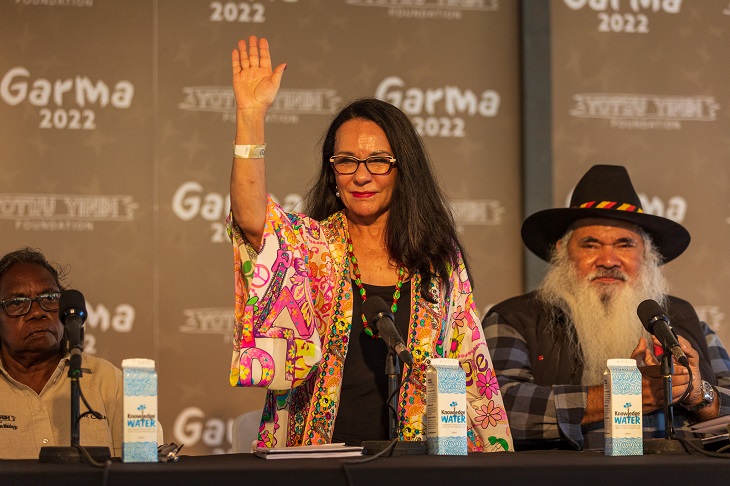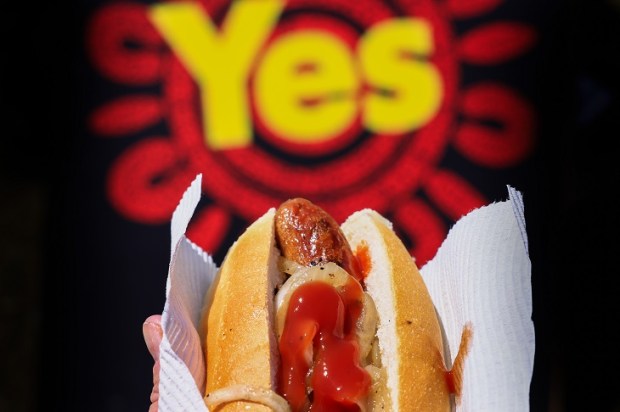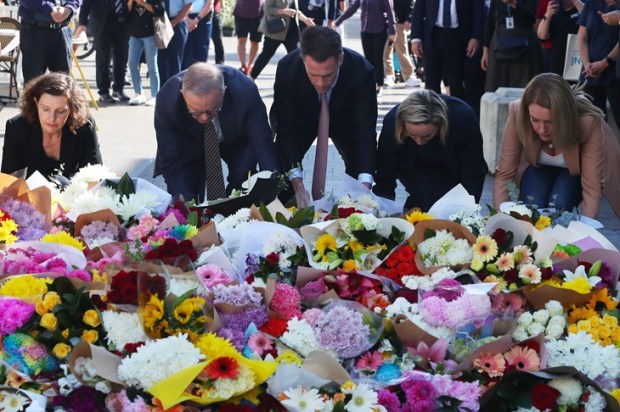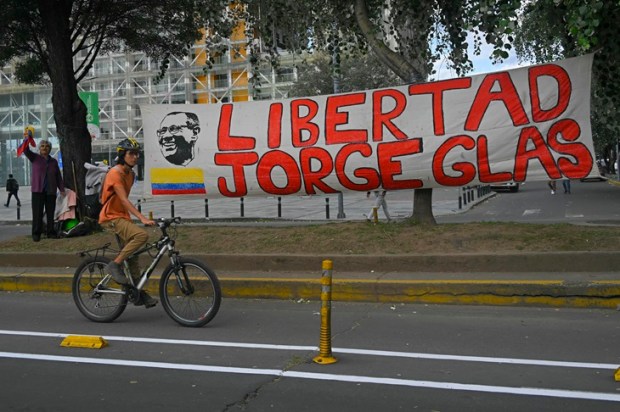Never before have Australians been asked to give so much with so little information. For those who choose to remain uninformed about the ‘Voice’ to Parliament, you will have no one but yourself to blame.
When it comes to a referendum, there will be some who refuse to vote for anything in abject ignorance – they are at least prepared to ponder where a ‘Voice’ for an ethnically defined minority of Australians might lead. The signs are already evident that the push for a Voice is about far more than words…
Paul Bongiorno, a long-time Canberra journalist, reported recently that Foreign Minister Penny Wong and Special Envoy for Reconciliation Pat Dodson are on a mission to the United Nations in New York to address the UN General Assembly.
‘They are there to spell out what the Albanese government means when it talks of having a First Nations foreign policy based on righting a historic wrong […] this is a point made very strongly by strategic analyst Huon Curtis in The Sydney Morning Herald.’
Bongiorno goes on to say:
‘He says we have to demonstrate that we are facing up to a shared damning truth with other colonial nations that we have trashed the human rights of our Indigenous people – and continue to do so by withholding constitutional respect and recognition.
‘Not mere words, but an acceptance of the claim First Nations people have to uniquely participate in the affairs of the contemporary nation.’
Senator Patrick Dodson has said in the past:
‘In Australia we are currently having a conversation about how we bring First Nations perspectives to the forefront of all that we do, and this includes foreign and trade policy.’
And:
‘First Nations experiences and practices can enrich our diplomacy and strengthen our relationships with other countries, including in the Indo-Pacific region.’
So, not only is our federal government taking to the world something it has not explained to Australians (but which will go to a referendum), it is entrenching in our global image that we are a First and Second Nation people. By their admission, some Australians now come first while most come second. It is a situation that leaves the ‘first few’ having greater rights than the rest.
That sounds both ominous and undemocratic.
Given the lack of clarity in terms of what a Voice might mean for the future, it would be wise to explore possible outcomes, since all outcomes are possible when the boundaries have not been clearly defined.
Most people are happy to vote for an idea, particularly one which makes them feel noble. Fewer are happy to give their assent to something which will cost them money. The most important question for all Australians then is: ‘How much would you be prepared to pay as compensation to Australians with Aboriginal ancestry?’
For all those who shout, ‘But it isn’t about that!’ – I would simply say, at this point we have no idea what the Voice is about, although several high-profile activists have declared that reparations are the end goal.
A frequent comment at protest rallies is, ‘always was, always will be Aboriginal land’, followed by, ‘pay the rent’. Both statements represent a claim for compensation. Such race-based entitlement is racist and undemocratic, but a ‘Yes’ vote for the Voice entrenches these attitudes in the Constitution.
Our island continent was not ‘always’ Aboriginal land. Homo Sapiens made their way to Australia much later than Europe and Asia. For most of its truly ancient history, Australia had no humans to call it home.
‘Aboriginal’ is a generic term that does not represent a united people. Their oldest ancestors are widely believed to have arrived on the landmass of Sahul (now two separate lands of Australia and New Guinea) between 47-55 thousand years ago and separated into distinct genetic groups in the modern Australian landmass 30 thousand years ago. Aboriginal Australians are most closely related to New Guineans and the people of Mamanwa (from the Philippines). There is considerable variation geographically, with ancient Western Australian tribes visibly different in appearance and culture, while another study showed Northern Aboriginal Australians share 11 per cent of their genome with people from India dating back 4,000 years (suggesting another wave of migration linked to the emergence of advanced tool-making and the appearance of the dingo which is similar to the Indian dog).
Aboriginal tribes have been extremely resistant to DNA testing (widely prevalent in other parts of the world) meaning we know less about their migration patterns and the origin of the 350-500 distinct groups than we should.
Regardless, genetic history, while interesting personally, should be meaningless to citizenship status in a modern democracy.
The use of terms like ‘First Nation’ (imported from North America) and calls for a Voice represents a race-based collective system that is elitist, divisive, and racist. It should not matter whether you have been an Australian citizen for ten hours or can trace your ancestry back 10,000 years. The point of the democratic system is to provide a level of equality for all citizens, regardless of race, creed, gender or indeed, longevity. If Australians agree to the concept that some of us, around 3.1 per cent, should have more rights, then we are betraying democracy in the name of tribalism. And that will have a cost.
How much would you be prepared to pay as compensation to Australians with Aboriginal ancestry?
The outcomes of a ‘Yes’ vote for a Voice remain unknown, but if you put your trust in government to ‘do the right thing’ then you have not been listening or watching in recent years.
We are entering a new version of the Matrix. If you have not seen that movie, it depicts a dystopian future in which humanity is unknowingly trapped inside a simulated reality, the Matrix, which intelligent machines have created. A ‘Yes’ vote for a Voice may lead us into a similar dystopian future in which Australians are unknowingly trapped inside a reality that unintelligent politicians have created.
The premise of the Voice is that Australians with Aboriginal ancestry are suffering because Anglo-Europeans colonised Australia and therefore all those with Anglo-European ancestry are responsible and accountable. The fact that most of those who register Aboriginal ancestry are not suffering, but doing as well, often better, than anyone else, is ignored.
If Australians agree in a referendum that the 25.3 million Australians who do not have Aboriginal ancestry are responsible and accountable for this undefined ‘suffering’, we have to ponder where this might take us. It always comes down to the money. That is the raison d’etre of compensation and reparation.
A tithe could be demanded from all those without Aboriginal ancestry which, once gathered, could be distributed to all those with Aboriginal ancestry.
Tithe, (from Old English meaning ‘tenth’), is a custom dating back to Old Testament times and adopted by the Christian church whereby lay people contributed a tenth of their income for religious purposes, often under ecclesiastical or legal obligation. The money (or its equivalent in crops, farm stock, etc.) was used to support the clergy, maintain churches, and assist the poor.
Despite serious resistance, tithing became obligatory as Christianity spread across Europe. It was enjoined by ecclesiastical law from the 6th century and enforced in Europe by secular law from the 8th century.
In essence, we fund our Medicare system with a salary tithe or tax, so the precedent for such things is well established. For those who are retired, perhaps the tithe could be taken from their pension, or, if they own a home, waiting as a tax to be paid on death and sale of assets. Surely this would gather enough funds to compensate annually, because one presumes it must continue for as long as any Australians exist who have some Aboriginal ancestry…
We would perhaps need to have a sliding scale of tithe, depending upon how far Second Nations Australians could trace back their inherited crime. And perhaps we would also need to look at those receiving such compensation in terms of how deserving they might be. This would have to come down to percentages. Someone who is 100 per cent Aboriginal must be suffering the curse of colonisation at far greater levels than someone who is less than 1 per cent and compensated accordingly.
To be completely fair we would need to put in place a Ladder Effect of ‘guilt’ descending down to Australians without Aboriginal ancestry ranking how long some ancestry has been here, all the way to the least culpable: those who became citizens recently. There would be something of a ‘get out of jail free card’ for new migrants.
In other words, only colonial Australians would face a fine for their ancestry, regardless of whether their ancestors actually did anything.
There would be a question as to whether those of mixed Aboriginal ancestry had their guilt (and money) cancelled out.
Do we really want to create a Constitutional change that sets in motion a political system that fines Australians of European ancestry, in perpetuity, because of a British settlement in 1788? Does it sound utterly mad to start charging people based on their race, because that is what reparations entail…
We presume these will be ‘in perpetuity’ since the ‘wrong’ of British colonisation is permanent and the ‘suffering’ is genetic, not measurable. Whether or not charges are retrospective and calculated back through more than 200 years would be the question. The first payments might be lump sums and then just the regular deductions from your wage or the value of your home. Those not working and earning who own a home could have the amount owed, with interest added of course, to be collected when the property is sold.
How does all that sound? Who will be voting ‘Yes’?
Got something to add? Join the discussion and comment below.
Get 10 issues for just $10
Subscribe to The Spectator Australia today for the next 10 magazine issues, plus full online access, for just $10.


























Comments
Don't miss out
Join the conversation with other Spectator Australia readers. Subscribe to leave a comment.
SUBSCRIBEAlready a subscriber? Log in